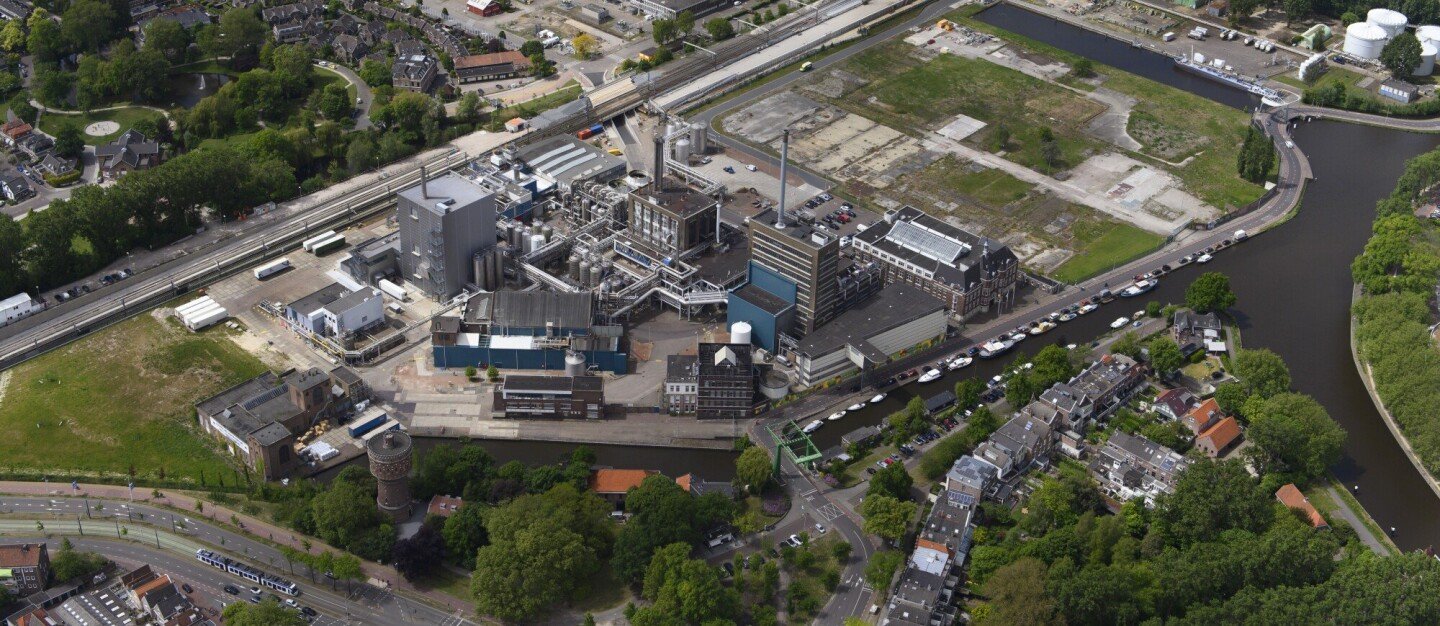
dsm‑firmenich is the landowner of the Biotech Campus Delft, a unique location and ecosystem where start-ups, scale-ups, large companies and knowledge institutions work together to develop sustainable innovations in the field of nutrition and biotechnology. Around 1200 professionals work at the Biotech Campus Delft and 22 companies are based there. Ambitions are high. Stefan: “Together with our partners, we are keen to develop the Biotech Campus Delft into one of the most important innovation campuses in Europe.”
On the campus, on the eastern side of the railroad toward the center of Delft, there is an area measuring 14 hectares (or around twenty football fields) which houses the Yeast Production Company, the Groote Kantoor, a port and a few other buildings. The former ‘Calvé site’ is undeveloped. “The Groote Kantoor was sold to BOEi in 2021 and will be renovated into a modern office space,” says Stefan. “Now that the Yeast Production Company is closing, we are looking at options to transform the freed-up space and give it a beautiful, sustainable future. To achieve this, we are now developing an integrated vision that matches the environment and the Biotech Campus Delft.”
Redevelopment scenarios
Michel Hek from VPR Consultants has been appointed to supervise the development of ‘East’ on behalf of dsm‑firmenich. We are working on a number of scenarios. “We’re looking into what a suitable development could be,” he says. “‘East’ is an industrial area in an exceptional location between the center of Delft and Rijswijk. What could the development of this area look like?” There are three options: ‘East’ will remain a business park, ‘East’ will become a residential housing area or ‘East’ will combine living and working.
Campus director Stefan has a preference: “We see a lot of potential in scenario 3: a combination of living and working. The northern part of the site would be used for (the growth of) business activities, and the southern part (the ‘city center side’) for a new residential area.”
In the proposed residential area, located to the south of the Groote Kantoor, you will still find six defining municipal monuments, including the Taplokaal. “We want to integrate them into the plan by giving them an alternative purpose, for example as homes or supporting functions for the area, such as hospitality,” says Michel.
Which scenario unfolds, is not just up to dsm‑firmenich. “The Province of South Holland and the Municipality of Delft together form the competent authority: they are responsible for the procedures relating to the planning of the area,” says Michel. “The province and the municipality, like dsm‑firmenich, look at the social relevance and a sustainable future for the area. More homes, more jobs or a combination of both? That’s what we’re discussing. In May, we will begin a participation process with local residents and stakeholders of the campus.”
New activity in 2028?
In any case, it will become more vibrant at ‘East’, with a rich array of activities and people. This also means that the transport needs will change. As soon as there is more clarity about all aspects such as the environment, mobility, preservation of monuments and the urban planning context, the participation process with local residents will begin in May. “We are looking forward to that, because we want to share and enrich the plans with the input of local residents,” says Stefan. Local residents will receive a formal invitation from the municipality to take part in the participation process. This year we are also conducting research into the soil, the flora and the fauna. In 2026 we can start decommissioning the buildings. We hope that there will be space for new activities from 2028 onwards.”
From East to West
The new plans offer opportunities for Delft, and dsm‑firmenich is keen to be a part of this. dsm‑firmenich has a history of successful transformations, giving others the opportunity to grow sustainably. And a new purpose for ‘East’ encourages the growth of the Biotech Campus Delft to the west of the railroad. “We started out with ‘East’,” says Stefan. “Currently, our growth is focused on ‘West’, where the Biotech Campus Delft is thriving. dsm‑firmenich is building the new headquarters and state-of-the-art application laboratories of its Taste, Texture & Health business unit on the site. And at the Rosalind Franklin Biotech Center, hundreds of scientists from dsm‑firmenich are working on sustainable solutions to global challenges in the field of nutrition. But it’s been a long time since we’ve been on our own at the Biotech Campus Delft and growth will only increase in the coming years. Sustainable real estate investor ASR Dutch Science Park Fund will be investing up to half a billion euro over the coming years to grow the campus. Together with a.s.r. and Planet B.io, we are developing the campus to become the leader in nutrition and biotechnology.”
photo: Yeast Production Company on 'East'